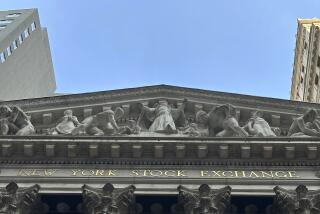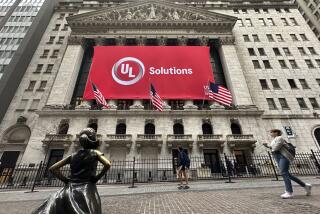Companies Stay Downbeat About Profit Outlook
- Share via
Corporate America is worried and downbeat about 2003.
The question, though, is whether that pessimism is on target -- or a bit overstated by executives who would rather be safe than sorry.
Keeping the bar low is a time-honored strategy for many companies: It makes it that much more likely that they’ll pleasantly surprise Wall Street with their results. If executives’ concerns are overblown and companies’ sales and earnings come in much stronger than anticipated this year, it could eventually bode well for the economy and the stock market.
But for now, Wall Street seems to be believing what it’s hearing. Major stock indexes closed Friday down for the third straight week, though the pace of the decline slowed.
The Dow Jones industrial average ended at 8,053.81, off nearly 1% for the five-day stretch after tumbling 5.3% the previous week. The Dow is down 3.5% year to date, on track for its fourth consecutive losing year.
As companies reported fourth-quarter earnings in recent weeks, investors paid less attention to those results than to what executives said about what lies ahead.
Thomson First Call in Boston, which tracks corporate earnings and forecasts, said Friday that 59% of the 332 companies that have issued first-quarter profit outlooks have warned about disappointing results compared with analysts’ expectations.
That is higher than the percentage of near-term outlooks that were negative at the same point in each of the last four quarters, Thomson First Call said.
One month into the last quarter, for example, 47% of companies predicting results for the period were downbeat, while 53% expected earnings to beat estimates or match them.
To be sure, there is plenty for executives to legitimately worry about, starting with the potential for war between the United States and Iraq. Such fears were cited by Federal Reserve policymakers last week as they concluded their first meeting of the new year.
“Oil price premiums and other aspects of geopolitical risks have reportedly fostered continued restraint on spending and hiring by businesses,” the Fed said.
The space shuttle disaster Saturday may well add to the unsettled feelings that investors and executives have.
At heavy-machinery giant Caterpillar Inc. in Peoria, Ill., Chief Financial Officer Lynn McPheeters said the company believes it has good reason to be cautious about sales this year, with the threat of war looming.
“The feeling we’re getting from our dealers, who are in direct contact with customers, is that project funding is being held up in many cases until this uncertainty goes away,” McPheeters said.
At Textron Corp., the manufacturing conglomerate that makes everything from aircraft to golf carts, some customers for such big-ticket items as Cessna corporate jets have been pushing buying decisions into next year, at least partly because of the geopolitical uncertainty, spokeswoman Sue Bishop said.
Textron’s Wichita, Kan.-based Cessna Aircraft unit has pared its estimate of business jet deliveries this year to 220 from an earlier projection of 250.
The prospect of war “is clearly having an impact” on the business climate, said economist Jason R. Trennert, an investment strategist at International Strategy & Investment Group in New York. “Among capital-goods-intensive companies, based on our contacts, it seems clear that the war is delaying their decisions to invest.”
This is a problem, Trennert said, because business investment is regarded as key to getting the economy humming again. Consumer spending, the biggest component of the economy, has contributed more than its share to gross domestic product growth in recent years and may be on the wane. Any rebound will need the support of strong business spending, he said.
But with war on the horizon, decision makers are “reluctant to step in front” and commit to big spending projects, Trennert said.
Santa Clara, Calif.-based semiconductor giant Intel Corp. said last month that it expected to cut capital spending as much as 26% this year because it’s unsure whether demand for personal computers will rebound.
The ripple effect hit Applied Materials Corp., the leading maker of semiconductor manufacturing equipment. Applied Materials, also based in Santa Clara, said Friday that orders fell more than expected in its quarter that ended last week. The company’s stock sank 98 cents to $11.97 Friday on Nasdaq and lost 8.1% for the month.
More modest corporate spending also is being held up by war fears, some companies say.
Hilton Hotels Corp. last week cut its profit estimate for 2003, with Chief Executive Stephen F. Bollenbach blaming the continuing slump in business travel for keeping the company from raising room rates to bolster results.
Bollenbach said Hilton expects to earn in the mid-to-high 40-cents-a-share range this year. Analysts had been expecting 54 cents, on average, according to Zacks Investment Research.
“In hotels you go through economic cycles, and you know how to maneuver through that,” spokesman Marc Grossman said. “But the world political situation is even more outside our control. When does a war start? How long does it last?”
Hilton stock fell 2.4% last week to close Friday at $11.71 on the New York Stock Exchange. It is down nearly 8% for the year after gaining 16% in 2002 on hopes for a sustained recovery in the lodging business.
Faced with the barrage of mostly gloomy corporate forecasts, at least some stock market pros are questioning how much of the pessimism is genuine and how much is caution for its own sake -- a deliberate attempt by companies to keep investor expectations low.
In the aftermath of last year’s financial scandals, many executives fear being accused of overstating their firms’ prospects, some say.
“If you’re a corporate manager, there’s absolutely no upside to saying that things are looking better,” said Tony Cecin, who as head stock trader for U.S. Bancorp Piper Jaffray in Minneapolis keeps a close eye on executives’ comments.
“Investors are seeking reassurance, but if you’re an executive, you can’t do that,” added Ed Keon, market strategist at Prudential Securities in New York. If you’re upbeat, and your forecast turns out to be wrong, “you could be sued or dragged before a congressional committee,” he said, only half joking.
Not all companies that have warned about 2003 results have specifically cited war fears. Some, including Kraft Foods Inc. and bearings maker Timken Co., said higher funding expenses for employees’ pensions would crimp results.
And some companies continue to forecast higher earnings this year -- among them, Walt Disney Co. The Burbank-based entertainment giant Thursday said its fiscal first-quarter net income sank 41% after one-time charges. But Disney reiterated that it expects profit to rise 25% to 35% this fiscal year.
The company conceded that a war could make those gains unachievable, but unlike some other firms, it chose not to play up the specter of war. Investors responded to Disney’s optimism, pushing the stock up $1.15, or 7%, to $17.50 Friday on the NYSE.
Some executives have looked hard for a potential “war effect” on their business and haven’t found it. Among them is Noel G. Watson, chief executive of Pasadena-based Jacobs Engineering Group Inc.
“At this point, it would be hard for us to point to any effect the war talk is having on our business,” Watson said. Among Jacobs’ private-sector customers -- 65% of the company’s business -- “we’re not getting cancellations. Things are generally moving ahead,” he said.
Some government projects are stalled by Congress’ failure to pass a budget. “But is that because of economics, politics or war?” Watson asked.
Jacobs’ shares have risen 4.6% this year, closing at $37.22 Friday on the NYSE. The stock gained nearly 8% last year.
More to Read
Inside the business of entertainment
The Wide Shot brings you news, analysis and insights on everything from streaming wars to production — and what it all means for the future.
You may occasionally receive promotional content from the Los Angeles Times.










